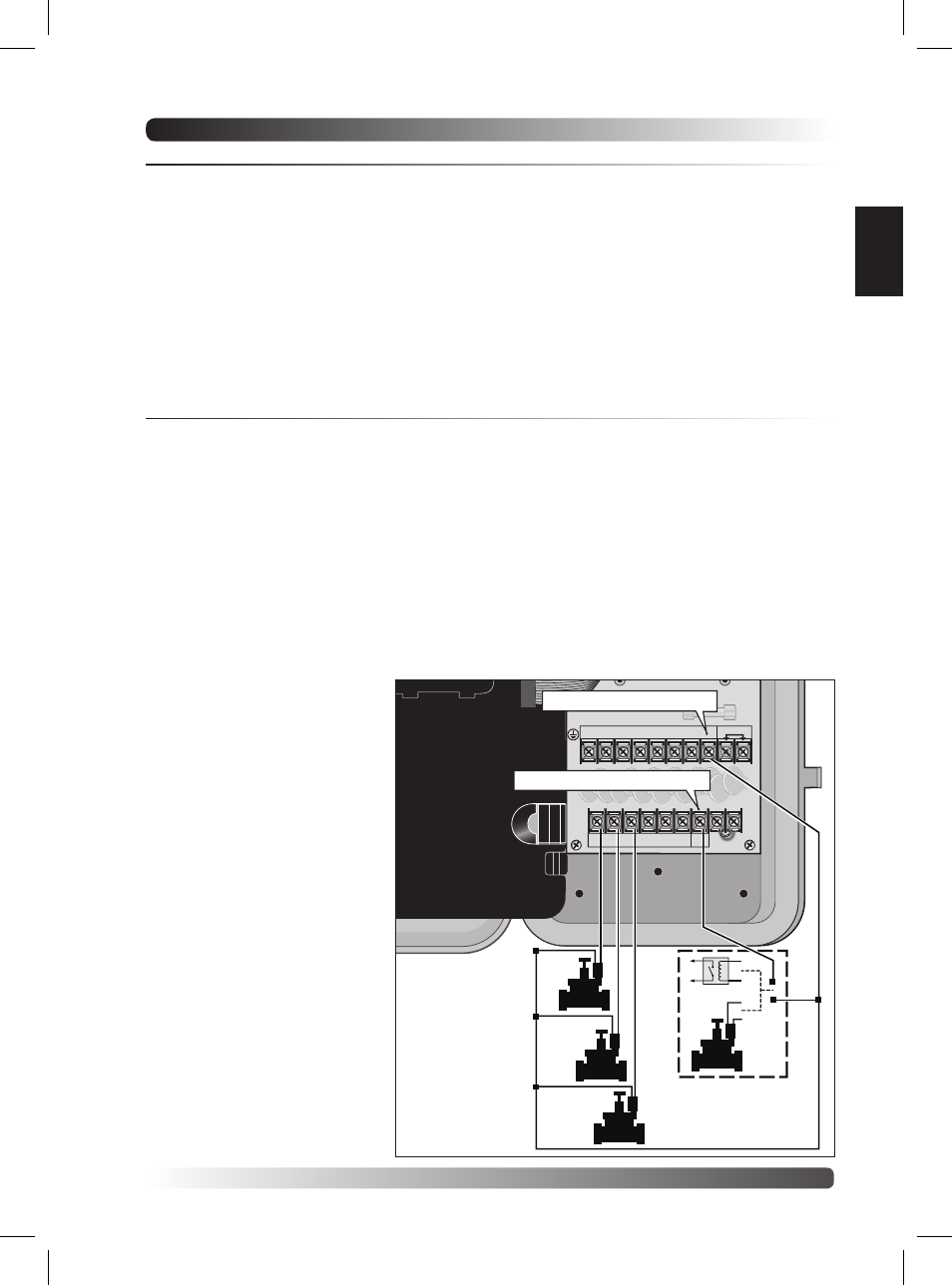Controller installation, Installing the controller cabinet, Connecting the valve control wiring – Irritrol Rain Dial R User Manual
Page 5: 32 1 mv, Eng lish

5
Controller Installation
Installing the Controller Cabinet
Select a sheltered location for the indoor model Rain Dial-R such as a garage or service room,
preferably within 5’ (1.5m) of a grounded electrical outlet. For outdoor controllers, choose a location
that protects against direct exposure to sun and contact with irrigation spray, and is at least 5’ (1.5m)
away from any motorized equipment.
1. Drive the provided stainless steel screw into a wall stud at a eye-level, leaving 1/4” (6.4mm) of
the screw shaft exposed.
Note: Use screw anchors when installing on drywall or masonry.
2. Hang the controller on the screw using the keyhole-shaped slot.
3. To secure the controller, drive one or two screws through the lower mounting holes.
Note: The lower mounting holes in the Outdoor cabinet have a thin veneer that is easily pierced
when installing the mounting screw during installation.
Connecting the Valve Control Wiring
For best results, use connection wire cable specifically designed for direct burial for automatic irrigation
systems. Use 18-AWG wire for connections up to 800’ from the controller, or heavier 14-AWG (2.0mm2 )
wire for connections up to 2000’. A separate wire for each valve (and relay) connection and at least one
common (return) wire is required.
Note: If control wire conduit is required, install it at this time. For conduit installation, use the 3/4”
(19mm) access hole in the indoor cabinet, or the threaded 1.25” NPT opening in the outdoor cabinet.
1. Route the control wire from the controller location to the valve(s).
2. Attach a separate control wire to either lead of each valve solenoid.
3. To provide a common (return) wire, attach the remaining lead of each valve solenoid to a single wire.
Note: To prevent corrosion and a possible short circuit, use waterproof wire connectors on all
external wire splices.
For reference at the controller, note the wire color used for each valve connection and its
corresponding watering zone.
4. Route the cable through the
largest opening in the base of
the controller cabinet or through
conduit if installed. Remove the
cable jacket to expose about 8”
of wires. Carefully remove 3/8” of
insulation from the end of each
wire to be connected.
5. Secure each valve wire to
numbered terminal in the
preferred operating sequence
order.
6. Connect the common wire to the
terminal labeled “VC.”
7. If applicable, connect one leg
of the master valve or pump
start relay control wire to the
terminal labeled “MV/PUMP”, and
the remaining leg to the valve
common wire.
Note: The controller does not
supply power to operate a pump.
The pump start relay must have
a nominal coil voltage of 24 VAC,
rated at 0.375A maximum.
EARTH
GROUND
MV/
Pump
Sensor
+
-
7
8
9 10 11 12
1
2
3
4
5
6
24 VAC
VC
Sprinkler
Control Valves
Common Wire
Pump Start Relay
or Master Valve
24V Relay
Master Valve/Pump Terminal
Valve Common Terminal
3
2
1
MV
Eng
lish